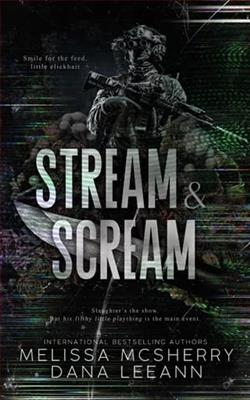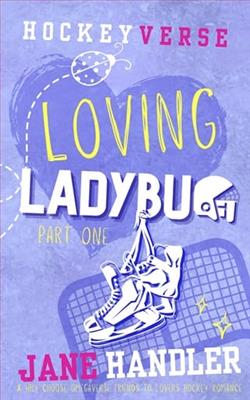Page 22 of Exit Lane
“You don’t have to do anything.” He’s holding my shoulders, squeezing them, desperately searching for me in the vortex of all this. “Mar, nothing changes. I’m going to be OK.” Hearing the line again, the one I carried in my pocket like a promise, ruins me. It wasn’t true for my dad. It won’t be true for Teddy. Grief is what I left in Iowa. It’s the part of my story I outran and outworked, and I refuse to be pulled back into its bottomless despair. My resolution hardens as the rest of the park slowly comes back into view.
“I love you. And I can’t go through this again. Teddy, I’m so sorry.” I shove my keys into his hands and run, away from the cascading lights and into the dark night.
The frigid air cuts through my lungs, and I relish the pain. A hurt that can be remedied. I have nowhere to go—no plan—but my internal compass leads me to a cozy used bookstore a few blocks away where I once bought a gift for my mom’s birthday.
The bell tolls as I duck in from the cold. The salesperson recognizes me and quickly grasps the state I’m in. “Love,why don’t I show you back to the rare books room? Maybe some browsing and privacy will do you some good.”
Among the dusty volumes wrapped in plastic, I drop to the floor and pull my knees close. Sobbing, I feel every ounce of regret for how I treated Teddy. It’s the same flavor of regret I felt after seeing him drive away when he dropped me off at my first New York apartment and after hailing a cab from karaoke, but there’s a sinking feeling that accompanies the sharpness. Like there’s poison on the blade. I register it as a self-inflicted wound: The pain I’m feeling now is just as excruciating as the sadness I’m trying so desperately to protect myself from.
It’s not too late, I tell myself. I could run back to the park, take it all back, and love him through this terrible thing. But instead, I sit, paralyzed, for an hour while the tears fall.
I make it back to my apartment in a haze, and when I do, his stuff’s cleared out and a note sits on my nightstand. “I love you. No matter what. xTMc.”
There’s nothing to do but call Sloane, who answers on the first ring. “Hi. I know. You don’t have to explain. Carter filled me in. I wish I was with you right now.”
I start sobbing all over again as I wrap myself in the sheets that still smell like Teddy. “Oh, M. Just put me on speakerphone, and we can talk when you’re ready.”
XVII
Teddy
At the airport, I shut myself into a bathroom stall so I can cry and call Carter before boarding the flight I rebooked on the way here. “I’ll meet you in New York. We’ll do this together.” It’s simple when he says it, like getting an MRI scan to rule out any other tumors is what every guy in his late twenties does when he’s overdue for a catch-up with his best friend.
The flight feels eternal, the liminal space offering an unwelcome home for every doubt and fear. The scene of Marin and me at Tivoli plays out in slow motion, on repeat. Our time in Copenhagen, entrapped as if in a snow globe, always felt destined to shatter. I know better than to think things could be as simple forever as they were for one perfect week. But the back-to-back blows I’ve been dealt today are made all the more painful by the sense that I should have seen them both coming. “Devastated” isn’t a big enough word.
Maybe I can win her back, I think.After I’m healthy.My face crumples, and I turn toward the plane window to hide it as I’m struck with the heart-shattering reality: She doesn’tlove me enough to go through this alongside me. Mar loves me when it’s convenient, those nights she’s alone in a new city or needs a ride or wants to be reminded of the life she’ll never let herself return to. Hope fades into something closer to resentment, but not enough to stop me from scrolling through the dozens of photos I took of us on my phone until the pilot announces our landing.
Carter’s there, waiting at the gate, a suitcase of his own in one hand and a posterboard scrawled with “It’s going to be OK” in the other. “Sloane’s made you watch too many rom-coms, man.” I laugh for the first time since getting the news and pull him in for a hug.
He squeezes me tighter. “I figured if I put it on a fucking sign, maybe we’d find it easier to believe.”
At first, with the constant beeping of machinery as my only consistent companion, Marin is the lone thing on my mind. I must waste hundreds of hospital cafeteria napkins penning letters to her I never send. Their content ranges from “I’m sorry” to “How could you?” before circling back to “I miss you.”
The true road to recovery starts with an all-beige short-term rental apartment in Rochester, Minnesota. Dr.Ng thinks keeping a degree of normalcy, a.k.a. my own toaster oven, will be important to the success of the treatment. Basking in my autonomy, trying to ignore the couple across the hall scream-fighting at six in the morning, I butter somesourdough before heading in for a regular appointment. I’m at Mayo Clinic most days, and when I’m not, I’m here.
My entire life has shrunk down in size. Even the heartbreak, which seemed to take residence in every crevice of my brain, has contracted over the month I’ve been here. I think about Marin when I’m falling asleep, longing mixing with anger, sadness with grief, and I imagine her here. Not because it feels realistic. But because the thought of it brings me back to my happiest self, before any of this seemed real.
I was ready to let my love for her dictate the rest of my life. I turn the thought over and over one night while falling asleep, practically marveling at it. In the hours I’ve spent staring off into space under an IV, I’ve considered every possible excuse for her reaction. None of them pass inspection. She forced my hand. Moving forward can’t involve her. What’s next has to be with someone new, someone who loves me—even when it terrifies them.
I have grand visions of keeping my life—my real life—on ice through my treatment, but after going back and forth over email with the Head of People at FourVC, that bubble bursts. I can take twelve weeks of medical leave, but their policy doesn’t leave room for working from Minnesota. They offer to pay for weekly first-class flights to and from the city and hint at a substantial severance package as the alternative.
It’s obvious this is the moment to use the emergency fund I’ve been saving for almost a decade. They’ll extend my health insurance through the end of the following year, and getting better can be my only focus. I don’t know thatI want to hear from Marin, but this makes it all the more likely that I won’t.
During the second month of treatment, everything starts to shift into some kind of new normal, in the way that life does. Carter flies up every other weekend. My mom and dad stay in the spare bedroom when they can, or my sister does, visiting from the University of Wisconsin. We play board games on Friday nights and try not to talk about upcoming scans. They all know I’m contending with something emotionally beyond this disease, but they don’t ask me to share. I take great Midwestern comfort in their avoidance.
Marin
Violet and Sloane visit for spring break, and I plan an entirely new itinerary for their week with me, eliminating any stops that I test-drove with Teddy. I keep us impossibly, exhaustingly busy, nervous that any downtime will invite conversation about what happened. I plead with Violet to regale us with tales of undergrad antics and pepper Sloane with questions about the upcoming table read for the screenplay she finally finished. I never once bring up my own emotional turmoil. I don’t tell them that for the first time since the months that followed my dad dying, I wake up in the middle of every night drenched in cold sweat and unable to fall back asleep.
Dropping them off at the airport, I give Violet a Rolexwatch, a smaller version of the one of my dad’s that I wear every day, as a graduation gift. “He would be so proud of you, V. I’m so proud of you.”
She pulls me in for a hug, one that says what we can’t, and when we step apart, she looks at Sloane, giving her the kind of sisterly nod that turns my stomach into an instant knot.
Sloane sighs, reaching a hand out for mine, but before she can make contact, I cross my arms.
“I’m sorry. About Teddy.” She forces eye contact. “It’s a really hard time for all of us, and I know you don’t want to talk about it, but I also know you’re not OK. I can’t—we can’t leave here without at least acknowledging it.”
I look away, toward the security line. We were so close to never addressing it, even if the tension was palpable every second of their visit.















